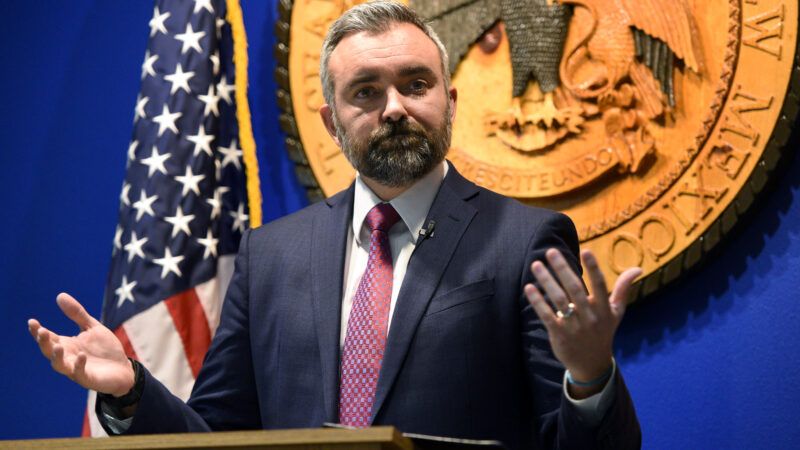Abortion 'Sanctuary Cities' Under Scrutiny in New Mexico Supreme Court
Abortion issues come before two other state Supreme Courts—in Arizona and Wyoming—this week as well.

Abortion access issues are up for debate in three state Supreme Courts this week, with at least one case carrying potential implications that stretch beyond its borders.
In New Mexico—where abortion is legal—state Supreme Court justices are being asked to consider whether individual cities and counties can pass local abortion bans and restrictions. The case stems from laws passed in two cities (Clovis and Hobbs) and two counties (Roosevelt and Lea) that banned the shipment of anything used to perform an abortion. New Mexico attorney general, Raúl Torrez asked the New Mexico Supreme Court to nullify these bans. Oral arguments in the case (State of New Mexico v. Board of County Commissioners for Lea County) are scheduled for Wednesday.
"The New Mexico Constitution provides broader protection of individual rights than the Federal Constitution, and these ordinances violate the New Mexico Constitution's protection of equality, liberty, privacy, and inherent rights," argued Torrez in his petition to the court. "The local governments' actions also exceed their authority to legislate on a matter of statewide importance for which the Legislature has preempted local regulation."
The case could reverberate beyond New Mexico, since the city and county bans in question all cite the federal Comstock Act. This 1873 law bans the mailing of obscenity, which is defined to include instruments of abortion (among other things). Since the four ordinances in question here were passed, the New Mexico legislature passed a law that prohibits local governments from restricting or interfering with reproductive freedom. But Lea County argues that it's impossible to say how it applies until federal courts rule on "the meaning and application of the federal Comstock Act in a post-Dobbs environment."
The Comstock Act "has been largely dormant for decades, but anti-abortion activists say that by citing the federal law in local ordinances, they hope to escalate the matter to the Supreme Court of the United States," notes NPR.
In addition, the local abortion laws could be "considered test cases for how anti-abortion activists will operate in 'blue,' or Democratic-controlled, states where abortion remains legal," as Reuters suggested last fall. "Mark Lee Dickson, the head of the Right to Life of East Texas and the architect of the 'sanctuary city' movement that has seen over 50 cities adopt anti-abortion measures in Texas and other conservative states, hopes to replicate the success elsewhere in New Mexico and in other blue Democratic states."
How this case is decided could render it a playbook for other abortion "sanctuary cities," or a playbook for state authorities looking to oppose them.
Meanwhile, in Arizona, a near-total ban on abortion comes before the court tomorrow, along with a ban on abortions that take place in later pregnancy. The latter was passed in 2022 and bans abortion after 15 weeks; the former, from 1864, outlaws abortion almost entirely (excepting cases where a pregnant woman's life is threatened). The older law comes with a sentence of two to five years in prison for anyone who assists in terminating a pregnancy and remains on the books even though it wasn't enforced post-Roe v. Wade.
After the Dobbs decision overturning Roe last year, it was unclear whether the state would start enforcing the century-plus old law again. In December 2022, the Arizona Court of Appeals weighed in with a ruling that the 2022 law applied to doctors and the 1864 law to everyone else.
Arizona's Supreme Court this week will hear arguments about whether the older ban is still in effect or whether the Arizona legislature repealed or limited it by later enacting laws like the 15-week ban.
The case in Wyoming stems from whether abortion counts as health care. A court in Teton County, Wyoming, is hearing the matter this week—and pro-life activists and lawmakers want to intervene (that is, to join in the case). The State Supreme Court has been asked to determine whether they—state Reps. Rachel Rodriguez-Williams (R-Cody) and Chip Neiman (R-Hulett) and Right to Life of Wyoming—can intervene, after the Teton County court ruled in June that they could not.
Oral arguments in the case are scheduled to start tomorrow. If the Court rules that Rodriguez-Williams et all can intervene, it would delay the conclusion of the case and could require it to start over again.


Show Comments (34)